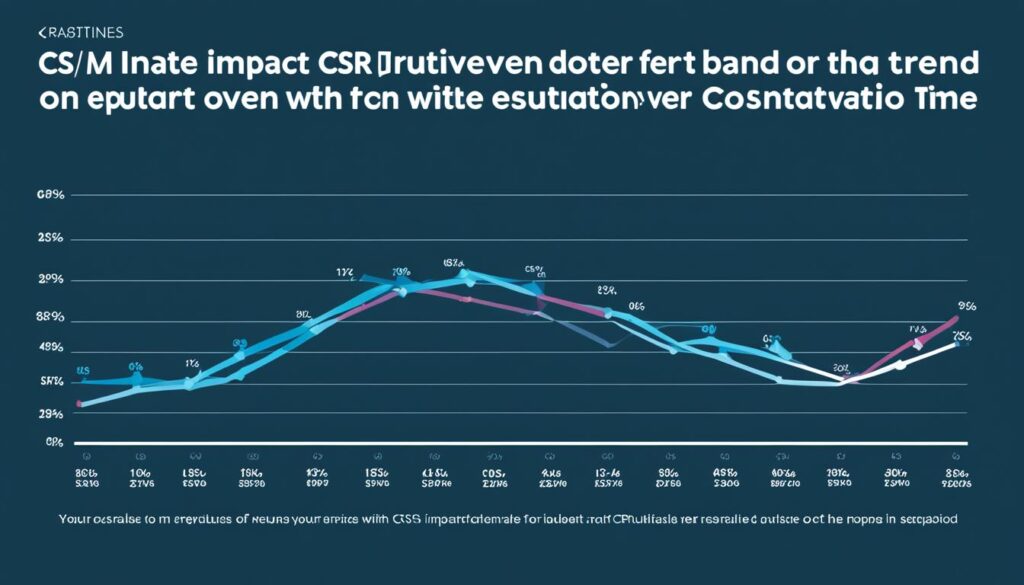Can a company’s good deeds shape its public image? In today’s market, corporate social responsibility (CSR) is key for businesses to stand out and gain trust. A huge 77% of consumers want to buy from companies that aim to make the world better1. This shows how big an effect CSR can have on a brand’s image and how people act.
CSR is more than just doing good; it’s a smart marketing move that can increase profits. Research shows that good CSR efforts make customers happier and more loyal1. When companies act responsibly, they often see their reputation and image get better1.
CSR’s effects go beyond what people think of a company. It’s also key in drawing in and keeping good employees. Almost 70% of workers say they wouldn’t work for a company without a strong purpose2. This shows how important CSR is for both the brand outside and the culture inside a company.
CSR touches many parts of a company, like finance, operations, sales, and HR2. This shows how deep CSR can be in a company, affecting everything from being recognized to how well it does1.
Key Takeaways
- 77% of consumers prefer buying from socially responsible companies
- CSR activities directly impact consumer satisfaction and loyalty
- Socially responsible actions enhance corporate reputation and image
- 70% of employees prioritize working for purpose-driven companies
- CSR influences multiple aspects of organizational operations
- Authentic CSR strategies are crucial for building brand reputation
Understanding Corporate Social Responsibility (CSR)
Corporate Social Responsibility (CSR) is when companies balance their goals with the needs of society. It’s becoming more important with globalization and international trade. Companies see CSR as key to being sustainable and accountable3.
CSR covers many areas like taking care of the environment, managing people, and being committed to goals. The idea of CSR now includes economic, environmental, social, ethical, philanthropic, and legal aspects. This broad approach helps businesses meet the needs of customers, society, and workers at the same time4.
In Australia, 81% of people think companies that care for the planet add value to their brands. This shows how important CSR is for a brand’s image in Australia. But, only 16% of Australia’s packaging is recycled or reused, showing the need for better sustainability efforts5.
CSR shows a company’s commitment to doing well over time. It affects how well a company does financially, how customers trust it, and how stakeholders see it. For example, companies that focus on CSR tend to keep good employees, which makes them more productive5.
“CSR is not just about doing good; it’s about doing good business.”
Big companies like Johnson & Johnson and The Walt Disney Company are serious about CSR. They invest in being more sustainable and reducing their environmental impact. These efforts show a deep commitment to doing good, not just making money5.
Looking into CSR more, it’s clear it’s not just a passing trend. It’s a key part of how businesses work today. It’s about making a positive impact and making sure a company’s social and environmental actions match its main goals and values4.
The Relationship Between CSR and Brand Reputation
Corporate Social Responsibility (CSR) is key to shaping a brand’s image and reputation. In Pakistan, research showed that CSR boosts the reputation of companies and improves how employees act6.

In Pakistan’s banking sector, CSR is becoming more important. With assets of Rs. 19,197.1 billion and deposits of $13,755 billion, banks can use CSR to build their reputation7. However, Public Sector Banks (PSBs) are missing out on using CSR to boost their brand value.
CSR affects how customers act and stay loyal. A big 91.4% of customers would buy from companies with great CSR programs. Also, 84.3% would trust such companies more during tough times8. These facts show how CSR impacts customer satisfaction and loyalty.
Being eco-friendly is a big part of CSR and helps improve a brand’s image. Companies that focus on the environment often see better reputations. This link between CSR and reputation gets stronger in companies with a strong culture6.
CSR does more than just make companies look good. It also makes customers happier and more loyal. By having good CSR plans, companies can build a strong brand, do better for the environment, and make a good impression on people.
Corporate Social Responsibility Impact on Reputation

Corporate social responsibility (CSR) is key to a brand’s reputation. It makes 85% of consumers more likely to support a business that takes part in CSR9. This shows how CSR changes how people see a brand and its value.
CSR helps manage a company’s reputation. In fact, 40% of companies say their CSR efforts helped fix their reputation during tough times9. This proves the power of a strong CSR plan in keeping and boosting a brand’s image.
CSR also makes employees happier. 67% of workers feel more connected to their jobs when their company cares about social responsibility9. This leads to better job satisfaction and people staying with the company longer.
Being open about CSR is key to trust. 78% of people think it’s important for companies to share their CSR efforts clearly9. Also, 95% of companies believe matching CSR with their values keeps their brand real and respected9.
CSR does more than just improve how customers see a company. 74% of Americans think companies should lead and make a difference10. Millennials, in particular, look for brands that care about social issues when they choose what to buy.
CSR can be many things, like helping the environment or helping the community. For instance, recycling programs or volunteer days can help the planet and bring employees together10. These actions not only make a company look good but also build trust with customers and reach more people.
In the end, CSR is a big deal for a company’s reputation. It builds trust and makes stakeholders see a company in a better light. Companies that focus on CSR do better in the long run.
Measuring the Influence of CSR on Brand Reputation

Looking at how Corporate Social Responsibility (CSR) affects brand reputation is complex. We use many ways to see if CSR works well. These include surveys, social media checks, looking at the news, and reading customer reviews11.
Understanding how CSR changes brand value is key. A study with 429 people showed that what companies do for social good changes how people see them and what they buy12. This shows how important CSR is in making customers think better of a company.
Looking at money matters also tells us if CSR works. We see if selling green products helps sales and cuts costs with less energy use11. Important CSR goals are:
- Community engagement
- Environmental impact
- Employee satisfaction
- Charitable contributions
New tools have changed how we learn from people. What took 100 hours and six months before can now be done in just 10 minutes13. This fast way of checking lets companies quickly change their CSR plans. This makes their CSR efforts better for their brand.
| Metric Category | Examples |
|---|---|
| Customer Metrics | Brand awareness, Purchase intention |
| Brand/Media Metrics | Social media sentiment, Media coverage |
| Employee Metrics | Satisfaction, Retention rates |
| Financial Metrics | Sales growth, Cost savings |
By using these metrics together, we get a full view of how CSR affects brand reputation. This way of looking at things helps companies improve their CSR plans. It helps them make smart choices, which strengthens their brand and position in the market1113.
Strategies for Implementing Effective CSR Initiatives
Effective CSR implementation needs a strategic plan that matches business goals. Companies see the value in having a full CSR strategy. Deloitte’s survey of over 2,000 C-suite executives shows CSR links to more innovation, growth, and getting new employees14.
Getting stakeholders involved is key in CSR efforts. The Business Roundtable’s Statement of Purpose, signed by 181 CEOs, shows a promise to lead for all stakeholders’ benefit14. This boosts brand reputation and trust, like Starbucks does with its clear policies and diverse workforce15.

Getting employees involved is vital for CSR success. Studies show that sharing leadership and empowering employees in CSR leads to better team work, stronger community ties, and happier employees14. This matches PwC’s finding that 86% of employees like working for companies that share their values15.
Emerald Publishing Limited highlights the need to tackle economic, social, and environmental sustainability. Companies like LEGO are setting the pace, working on sustainability research and testing over 300 recycled materials for their bricks15.
| CSR Focus Area | Example Initiative | Impact |
|---|---|---|
| Corporate Philanthropy | TOMS’ giving program | $1.7 million contributed, 147,510 lives positively impacted15 |
| Environmental Responsibility | Sustainable practices implementation | Cost reductions, improved bottom line16 |
| Employee Engagement | Charitable giving decisions involvement | 85% increase in employee trust15 |
Companies face challenges in CSR, like measuring social and environmental impact, using resources wisely, and keeping up long-term commitment16. Yet, the benefits of good CSR are clear, leading to positive change and a better brand image.
Conclusion
Our look into Corporate Social Responsibility (CSR) shows its big role in making brands look better. CSR efforts make customers stick around and help companies do better financially17. Hotels, for instance, have grown a lot, with sales going up by about $100 billion over five years18. This growth matches the growing focus on CSR in the hotel world.
CSR does more than just make a company look good. It helps companies avoid risks and work better17. In the hotel industry, CSR efforts really help keep customers coming back18. This shows why companies should put CSR at the heart of their plans for lasting success.
Looking to the future, we should study how CSR works in developing countries. We need to look closer at how CSR affects different parts of a company. It’s clear that talking about CSR helps make customers and employees happier19. By seeing CSR as a way to stand out, companies can beat the competition and help society at the same time.
FAQ
What is corporate social responsibility (CSR)?
How does CSR influence brand reputation?
What is the relationship between CSR and organizational culture?
How can companies measure the influence of CSR on brand reputation?
What are some effective strategies for implementing CSR initiatives?
Source Links
- The Effect of Corporate Social Responsibility on Brand Image and Brand Equity and Its Impact on Consumer Satisfaction – https://www.mdpi.com/2076-3387/13/5/118
- How Corporate Social Responsibility Efforts Can Strengthen Brand Equity and Customer Loyalty – https://www.skillsoft.com/blog/how-corporate-social-responsibility-efforts-can-strengthen-brand-equity-and-customer-loyalty
- PDF – https://www.indecs.eu/2021/indecs2021-pp281-294.pdf
- The Truth About CSR – https://hbr.org/2015/01/the-truth-about-csr
- Understanding Corporate Social Responsibility (CSR) – https://online.vu.edu.au/blog/what-is-corporate-social-responsibility
- The impact of corporate social responsibility on firm reputation and organizational citizenship behavior: The mediation of organic organizational cultures – https://www.ncbi.nlm.nih.gov/pmc/articles/PMC9901298/
- Frontiers | Exploring the Relationship Between Corporate Social Responsibility, Trust, Corporate Reputation, and Brand Equity – https://www.frontiersin.org/journals/psychology/articles/10.3389/fpsyg.2021.766422/full
- How CSR Impacts Corporate Reputation | RepTrak – https://reptrak.com/blog/how-csr-impacts-corporate-reputation/
- The Impact of Corporate Social Responsibility on Brand Reputation. – https://medium.com/@aeark0011/the-impact-of-corporate-social-responsibility-on-brand-reputation-bc8b42613d2b
- Corporate Social Responsibility (CSR) and Reputation – https://blog.reputationx.com/csr-and-reputation
- How do you measure the impact of CSR on your brand reputation and performance? – https://www.linkedin.com/advice/0/how-do-you-measure-impact-csr-your-brand-reputation
- The impact of perceived CSR on corporate reputation and purchase intention – https://www.emerald.com/insight/content/doi/10.1108/EJMBE-12-2017-0068/full/html
- CSR Impact Measurement Authoritative Guide | sopact – https://www.sopact.com/guides/csr-impact-measurement
- 7 Best Practices for Creating an Impactful CSR Strategy – Submittable Blog – https://blog.submittable.com/csr-strategy/
- Creating a CSR Strategy: How to Forge a Lasting Impact – https://doublethedonation.com/csr-strategy/
- How Companies Can Implement CSR: Fostering Positive Impact In Business – https://charitymiles.org/what-is-corporate-social-responsibility/
- Importance of Corporate Social Responsibility: Creating Positive Impact Through Business – https://www.linkedin.com/pulse/importance-corporate-social-responsibility-creating-impact-magazine
- The influence of corporate social responsibility, ability, reputation, and transparency on hotel customer loyalty in the U.S.: a gender-based approach – SpringerPlus – https://springerplus.springeropen.com/articles/10.1186/s40064-016-3220-3
- Corporate reputation through strategic communication of corporate social responsibility – https://www.emerald.com/insight/content/doi/10.1108/CCIJ-02-2020-0047/full/html

